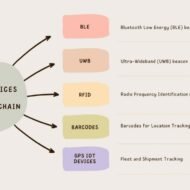Currently Browsing: Operations Management
Posted by Managementguru in Operations Management, Productivity, Supply Chain Management
on May 24th, 2024 | 0 comments

Managing a supply chain effectively is critical to the success of any business. The supply chain incorporates all activities involved in a product’s production and delivery, from sourcing raw material to final delivery to the customer. Efficient and effective supply chain management ensures that products are produced and delivered at the right time, in the right quantities, and at the right cost, ultimately leading to customer satisfaction and business profitability. Here are key strategies for managing a supply chain successfully. 1. Develop a Strategic Plan Aligning the supply chain strategy with overall goals is essential. This involves understanding the company’s long-term objectives and ensuring that the supply chain helps these goals. For example, if a company’s goal is to achieve rapid market growth, the supply chain must be flexible and scalable. Identifying potential risks, such as supplier reliability, geopolitical issues, or natural disasters, is critical. Developing a risk management plan to closely mitigate these risks, including having backup suppliers and contingency plans in place, helps in managing uncertainties. Implementing advanced technologies such as enterprise resource planning (ERP) systems, data analytics tools, and supply chain management software enhances visibility and control over supply chain processes. A supply chain consultant can guide you through a strategic plan. 2. Build Strong Relationships with Suppliers Fostering strong relationships with key suppliers through regular communication can lead to better pricing, improved quality, and more reliable supply. Continuously evaluating supplier performance based on criteria such as cost, quality, reliability, and delivery times helps in making informed decisions about supplier selection and retention. Developing long-term partnerships with reliable suppliers can result in mutual benefits such as joint product development, better terms, and increased stability in supply. 3. Optimize Inventory Management Using advanced forecasting techniques to predict customer demand accurately helps in maintaining optimal inventory levels, reducing the risk of stockouts or excess inventory. Implementing just-in-time (JIT) inventory management reduces inventory holding costs by only receiving goods when they are needed in the production process, thus minimizing inventory levels. Enhancing visibility into inventory levels across the supply chain through inventory management software ensures that you can respond to changes in demand or supply. 4. Implement Lean Manufacturing Principles Adopting lean manufacturing principles to eliminate waste in the production process involves identifying and removing non-value-added activities, improving process efficiency, and reducing costs. Fostering a culture of continuous improvement in the supply chain encourages employees to identify areas for improvement and implement changes to enhance efficiency and quality. Implementing robust quality control measures ensures that products meet the required standards, reducing the risk of defects and returns and improving customer satisfaction. 5. Leverage Data and Analytics Using data analytics to make informed decisions about supply chain operations involves analyzing data on supplier performance, inventory levels, and logistics to identify trends and areas for improvement. Implementing predictive analytics helps anticipate future demand and supply chain disruptions, aiding in proactive planning and reducing the impact of unexpected events. Establishing key performance indicators (KPIs) to measure supply chain performance and regularly reviewing these metrics helps assess the efficiency and effectiveness of supply chain operations, identifying opportunities for improvement. Conclusion Effective supply chain management is essential for achieving business success. By developing a strategic plan, building strong relationships with suppliers, optimizing inventory management, enhancing logistics, implementing lean manufacturing principles, leveraging data and analytics, and focusing on customer satisfaction, businesses can create a robust and efficient supply chain. These strategies help in reducing costs, improving quality, and ensuring timely delivery, ultimately leading to increased customer satisfaction and business profitability. Continuous improvement and adaptation to changing market conditions are key to maintaining a competitive edge in today’s dynamic business...

Posted by Managementguru in Operations Management, Project Management, Supply Chain Management, Technology
on Mar 27th, 2024 | 0 comments

In the current business environment, an efficient supply chain management process can be a key differentiator. Streamlining your supply chain reduces costs and enhances customer satisfaction and overall business performance. Here are some strategies to improve your supply chain management process. Embrace Technology Incorporating cutting-edge technologies like AI, IoT, and blockchain can revolutionize your supply chain. These technologies can enhance visibility, optimize inventory management, and automate processes, leading to improved efficiency and reduced costs. Leveraging technology allows businesses to adapt quickly to changing market conditions and customer demands. Enhance Collaboration Collaboration with suppliers, manufacturers, and distributors is essential for a smooth supply chain. Implementing collaborative tools and fostering strong relationships can lead to better coordination, faster problem resolution, and increased agility. Strong collaboration ensures that all parties are aligned with the overall supply chain goals, improving overall performance. Integrating Efficient Logistics Efficient logistics management is crucial for a streamlined supply chain. For example, platforms like Shiply connect shipping companies with clients, offering cost-effective and efficient shipping solutions. By leveraging Shiply and other advanced logistics technologies, such as transportation management systems (TMS) and warehouse management systems (WMS), businesses can optimize their logistics operations.Efficient transportation management leads to lower shipping costs and improved delivery times, while effective warehouse management minimizes inventory holding costs and ensures timely order fulfillment. Integrating logistics with other supply chain functions improves coordination and visibility, enhancing overall performance and customer satisfaction. Efficient logistics management also allows businesses to scale their operations as well as enter new markets more easily. Focus on Data Analytics Data analytics can offer valuable insights into the performance of your supply chain. By analyzing data, you can identify inefficiencies, forecast demand more accurately, and make informed decisions to optimize your supply chain operations. Data-driven decision-making helps businesses stay competitive and agile in the market. Implement Lean Principles Implementing lean principles, like just-in-time inventory management and continuous improvement, can eliminate waste and enhance efficiency. Lean practices can streamline processes, reduce lead times, and enhance overall productivity. Continuous improvement ensures that the supply chain is constantly evolving so that it can meet the changing needs of the business and customers.Implementing just-in-time inventory management reduces excess inventory, minimizing storage costs and the risk of obsolescence. Streamlining processes reduces waste and enhances flexibility, enabling the supply chain to quickly adapt to market changes. Continuous improvement nurtures a culture of innovation and efficiency, leading to ongoing enhancements in the supply chain’s performance. Prioritize Sustainability Adopting sustainable practices not only benefits the environment but also leads to cost savings and enhances brand reputation. Incorporating sustainable sourcing, packaging, and transportation methods can reduce carbon footprint and enhance supply chain resilience. Prioritizing sustainability ensures that the supply chain is resilient to external shocks and contributes positively to the environment. Businesses can achieve cost savings through reduced waste, energy efficiency, and lower resource consumption. Moreover, consumers increasingly prefer environmentally conscious brands, leading to enhanced brand reputation and customer loyalty. Embracing sustainability also future-proofs the supply chain, ensuring its viability in the face of changing regulations and market demands. Incorporating sustainable practices aligns with corporate social responsibility (CSR) goals, showcasing a dedication to environmental stewardship and social...

Posted by Managementguru in Business Management, How To, Operations Management, Supply Chain Management
on Dec 13th, 2022 | 0 comments

The dairy industry is facing many problems, now more than ever. For example, supply issues, climate change, and fluctuating consumer demand are all playing a part. Many of these challenges are outside of the scope of what the manufacturer and/or farmer can alter. That said, there is still leeway to bring about improvements and keep your business on track. We look at some of the recent obstacles and provide suggestions on how to handle them. Sustainability With the focus on sustainability, all producers are in the spotlight and expected to use scarce power and water responsibly. The hype also touches on the well-being of dairy animals, farming and production methods, as well as the type of packaging being used. All resources must be ethically sourced. Waste and carbon footprint must show a marked decline and how waste is dealt with is also important. Processes need to be scrutinized and adapted if necessary. Customers are turning to producers who take sustainability seriously and rejecting those who are not falling in line. Managing Product Variety Many manufacturers are producing more than one product. Then, it becomes essential to determine how to handle multiple lines for efficiency without contamination. Adverse consumer responses to just one product can affect the whole business. Quality and Safety Quality and safety are the buzzwords manufacturers need to pay attention to. You just cannot afford to make mistakes as this will impact your entire business. Choosing equipment designed for hygiene in the manufacturing process can keep your company in the green. For example, a slurry circulating pump that meets the hygiene requirements of the dairy industry is essential. Fluctuating Demand and Supply Chain Disruptions Little can be done to combat the rise in consumers insisting on vegetarian products instead of meat and dairy. Demand within the dairy industry is being reduced, causing competition among manufacturers and it is becoming harder to stand out unless you have great products that tick all the boxes and no negative feedback. At the same time, the Covid pandemic has caused major disruptions to the supply chain. What can dairy manufacturers do to sustain their businesses? Here are some moderating factors worth considering. Equipment Use equipment that is designed to deal with the challenges inherent in processing dairy products. These should ensure 100% hygiene (see above), and they must be accurate and quick to use. Get advice from expert suppliers if you are unsure of the optimal products for your operations. Manufacturing dairy requires optimal temperatures and, again, the right equipment for that is essential. With many delicate processes required to produce a perfect, safe, and hygienic product, processes and equipment must work correctly together. Use the right tools for the job, as the saying goes. This will also reduce wastage and by-products that must be disposed of correctly. Agility When you are producing a multitude of separate products at one plant, you need to pay careful attention to each line. This will ensure consistent productivity. It also means determining the perfect equipment solution and/or integration for each step and ensuring that there is no cross-contamination. Eco-Friendly Manufacturing Audit every aspect of your production lines and processes to reduce waste. This includes superior products and minimal wastage on poor quality produce that has to be thrown out. Only do business with sustainable-minded partners. Use equipment with lower energy consumption. Speedier processes will also reduce the use of power. Use eco-friendly packaging. While some obstacles are beyond your power to overcome, following this guide will maximize your overall performance and produce some...

Posted by Managementguru in Operations Management, Supply Chain Management
on Oct 31st, 2022 | 0 comments

Manufacturing managers have a lot of responsibilities. The flow of production runs through them, and their decision-making skills can have tangible consequences on the balance sheet of a business. With these three skills mastered, any manufacturing manager can become the engine that powers a successful business. Supply Chain Management This is one of the most important skills a manufacturing manager needs. No matter what sector of the manufacturing industry you work in, the manufacturing team is a part of a supply chain. Materials come in, and products go out. You need to be able to handle the logistical challenges that come with managing the constant flow of both raw materials and the finished product. The speed of this flow governs the capacity and potential of the business. The more you can do in less time, the more capacity and potential for profit your manufacturing process has. Product Development and Knowledge Not only do you need to know a lot about the products you are manufacturing, but you also need to have a knowledge of products, production processes, market demands, and methods of product development. Your position as a manufacturing manager puts you in a unique position to understand how a product is manufactured, and why. You can use your experience to inform both design and marketing processes to help develop better products that give more value to customers while being simpler to produce. At this level of management, you need to have a wider view of the business to make better decisions and better products. You can learn more about product development with ICAgile certifications in Product Ownership, get certification in your existing skills, and become a recognized expert in your field. This can be very beneficial to your resume, and your role in your workplace. Leadership and Team Building When people think of the manufacturing process, they often think of large machines that build a product piece by piece on a long, automated line that weaves its way through a warehouse. The truth is that a manufacturing process is only ever as good as the people that operate it. You can have highly efficient machinery, and automate nearly all of its processes, but without the right operation, they are useless metal. Manufacturing managers need to be able to both hire and inspire. You will be involved in the hiring process and must be able to spot signs of a good worker who will fit in with the team. You need to inspire the team daily too. The work on a production line, and all across the manufacturing process, can become monotonous, much more than the average job. It has huge benefits though and can be a lot of fun. If you work hard at keeping your workers enthused and involved, you will be able to grow both as a manager and as a business. These skills will all help you to develop as a manufacturing manager and be successful at it. You need to carefully balance the management of man and machine so that they can work in harmony together. Become an expert in your field by honing these skills and using them to push up your production...

Posted by Managementguru in Artificial Intelligence, Business Management, Operations Management, Productivity, Sales, Supply Chain Management, Technology
on Mar 25th, 2022 | 0 comments

Supply chain management (SCM) is the broad range of activities needed to plan, control and execute a product’s flow, from procuring raw materials and production through distribution to the final customer, in the most streamlined and cost-effective way possible. Ensuring all supply chain components are running as smooth as possible helps businesses to provide on-time delivery of products and services, with changing consumer demands and supply chain disruptions brought about by the recent pandemic. This blog post’s focus is to throw some light on “How IoT aka Internet of Things is bringing about a big impact” in the future of supply chain activities. Let’s first understand the 7 Principles of SCM Adapt supply chain based on service needs of every customer segmentCustomize logistics network for each customer segmentAlign demand planning across the supply chainDifferentiate product closer to customer’Outsource strategicallyDevelop information technology that support multi-level decision makingAdopt both service and finance metrics Now let’s look at the Impact of IoT in the future of supply chain. Asset Tracking One of the top and fundamental function of IoT in supply chain is asset tracking. Locating containers, objects and personnel is considered way important among the organizations Through RFID and GPS sensors, real-time location of a product, truck or shipping container can be known by logistics operators. Fleet Management Fleet management is another area to improve the efficiency of logistics operations. Through IoT it is now possible to connect all fleets to each other, which allows the fleet dispatchers to collect breadth of data from their fleet operations. Data included are: 1. Weather conditions 2. Traffic situations 3. Driving pattern and 4. Average speed When thoroughly analysed, this data can help logistics operators to find more efficient routes, manage driver head counts, save on fuel cost and optimize their fleet reliability, availability and efficiency. Tracking and Monitoring Inventory Levels in Real Time IoT sensors play a great role in tracking and monitoring inventory levels in real time. Amazon is now using Wi-Fi robots to scan product codes present on the products to keep track of their inventory levels. Bluetooth tags and beacons offer tracking data in more confined areas- many retail stores are using these tracking technology software to monitor customer traffic and provide marketing messages to their customers. Vendor Management By asset tracking., organizations tend to come out with high quality output, which in turn improves their relationship with the vendors. A recent survey states that up to 65% of the value a company’s product /service is derived from its suppliers. Predictive Maintenance Being an asset intensive process, right from production machinery to warehouse equipment and delivery vehicles, these assets need to be continuously monitored to ensure their functional efficiency. Smart sensors help the logistics operators gauge if a particular asset needs to be serviced ahead of time. This reduces considerable asset down time and asset failure, thus saving cost including maintenance...










